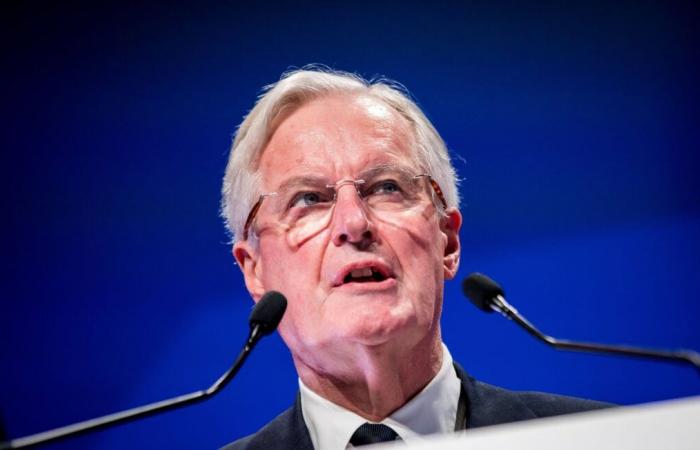“Everyone must take responsibility.” Until the end, Michel Barnier tried to avoid the fall of his government. But after the use of 49.3 on Monday to try to pass the Social Security budget, the New Popular Front and the National Rally each tabled a motion of censure. They will be debated this Wednesday afternoon and barring a miracle, the fate of Michel Barnier is already sealed. Emmanuel Macron will then have to find a successor. What are the possible scenarios to emerge from the political crisis? We take stock.
Bis repetita with Michel Barnier
Tuesday evening, in the National Assembly, the Macronist deputy Eric Woerth cited the name of… Michel Barnier to replace Michel Barnier. “Nothing prevents it from being renamed since there is no alternative majority,” whispered Nicolas Sarkozy’s former Budget Minister. He mentioned in particular a tighter government this time.
Advantage : The president would not have to rack his brains too much and would avoid the weeks of uncertainty that the country experienced after the legislative elections.
Inconvenience : This track is politically flammable since Michel Barnier would remain in Matignon despite the censorship, and while he seems incapable of finding a majority to govern.
Draw from “the central block”
The most likely avenue is that Emmanuel Macron finds a successor to Michel Barnier within the “central bloc”, in the former presidential majority or within the right. Several names have already been mentioned: the boss of MoDem François Bayrou, the Minister of the Armed Forces, Sébastien Lecornu, the Minister of the Interior, Bruno Retailleau, and even the President of the Senate, Gérard Larcher.
Advantage : This type of profile could prevent censorship from being immediately voted on by the National Rally, and would guarantee a minimum of stability.
Inconvenience : Once again, it is the RN which would have the cards in hand and could put pressure on the government’s action.
Give the NFP a chance
What if Emmanuel Macron decided to let the New Popular Front try its luck in Matignon? There would be a form of logic since it was the left which came in first (but without a majority) during the last legislative elections. As has been the case since the summer, the rebels have unsurprisingly pressed Emmanuel Macron. “We have said it again and again that Lucie Castets would be our candidate for this mandate,” said this Tuesday in the National Assembly the boss of the LFI group, Mathilde Panot.
Advantage : The person concerned has been preparing for several months now to manage the country.
Inconvenience : Lucie Castets, like any government supported by rebels, would probably be censored very quickly.
Try the center-left profile
This option now seems to be the preferred option of the Socialist Party. Olivier Faure thus called on Emmanuel Macron to appoint a left-wing Prime Minister open to “compromise” with the central bloc. “It is the Popular Front in government and the Republican Front in the Assembly,” summarized the boss of the PS. Clearly, a political personality capable of satisfying enough elected officials within the NFP but also on the Macronist side to avoid censorship. Former Prime Minister Bernard Cazeneuve, the president of the PS deputies Boris Vallaud or even Olivier Faure could correspond to such a majority.
Advantage: LThe fate of the future tenant of Matignon would not depend on the goodwill of the RN.
Inconvenience : Profiles are not common in the streets. And the rebels have already made it known that it was “out of the question” to consider an agreement with the Macronists.
A technical government
This is a card that had already been considered this summer. The idea would be to appoint technical profiles to Matignon and all ministries, who do not belong to any political camp. This would make it possible to complete the 2025 budget, and keep the country running until June, before a possible new dissolution.
Advantage : This solution to avoid total blockage could find a non-censorship majority within the National Assembly.
Inconvenience : The government of experts would have no democratic legitimacy and would not be able to make any decisions outside of the management of current affairs.
The resignation of Emmanuel Macron
This hypothesis has been claimed by La France insoumise for several weeks. In recent days, Marine Le Pen has also mentioned this avenue “to potentially emerge from a political crisis”, without directly calling for the resignation of Emmanuel Macron. “The president was elected democratically, legitimately,” replied the Minister of the Interior, Bruno Retailleau, this Tuesday in the Assembly, regretting a desire for “institutional chaos” on the part of the rebels.
Advantage : This would push for an early presidential election, allowing the French to decide on a political line.
Inconvenience : The situation would remain blocked in the National Assembly until next June, before a possible dissolution.






